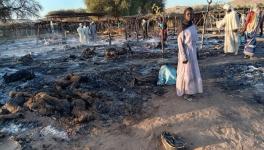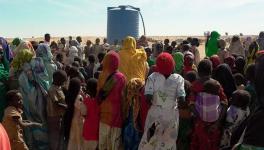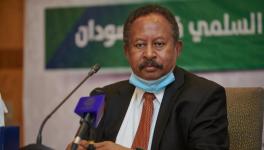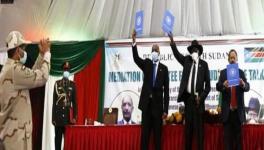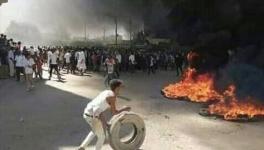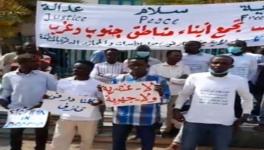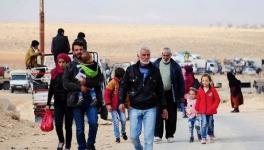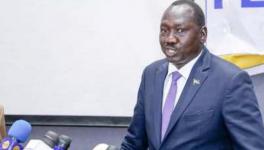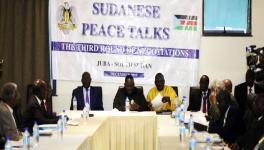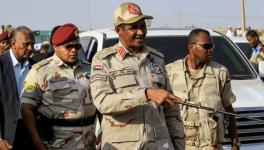As Peace in Sudan Remains Elusive, Protesters Mobilise to “Correct the Revolution”
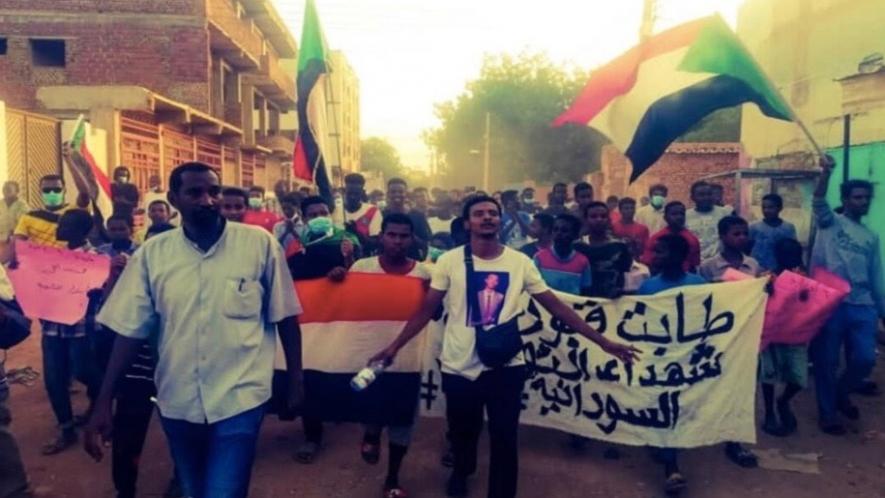
(Photo: SPA/Facebook)
Negotiations between the transitional government in Sudan and the armed rebel groups failed to conclude by the June 20 deadline. A peace agreement to end the civil wars, which have lasted for over a decade, remains elusive.
Meanwhile, the Sudanese Professionals Association (SPA), a confederation of trade unions and people’s movements which was in the forefront of the protests against former president Omar al-Bashir, has called for fresh agitations to “correct the revolution.”
Talks in final stages
The spokesperson of the government delegation for the peace negotiations, Mohamed El Taayshi, said on Monday, June 22, that the talks were in “final stages” and “more than 95 percent of the complex issues” had been resolved. “The remaining files [technicalities] require courageous and decisive decisions, and direct negotiation between the parties in Juba,” El Taayshi said.
The negotiations have been taking place via video-conferencing due to the COVID-19 pandemic. As per El Taayshi, direct negotiations will soon resume in South Sudan’s capital Juba, where the process began in October last year following the formation of the Sudanese transitional government.
Most of the armed groups represented in the negotiations by the Sudanese Revolutionary Front (SRF) have agreed to the eventual dissolution of their forces and the integration of their fighters into Sudan’s national armed forces, which will be structurally reformed. But differences remain on when this should happen.
The transitional government has demanded this process should begin immediately after the signing of the peace agreement.
Formed in August 2019 after the overthrow of dictator Omar al-Bashir, this civilian-majority government with significant representation from the military, has a mandate to rule for three years before holding elections.
Security and reparations for war victims
To protect the Internally Displaced Persons (IDPs) during this transitional period, the SRF has demanded the creation of a joint force consisting of its own armed forces along with those of the state.
The IDPs had to flee their homes and fields during the civil war and now live in camps. These camps have frequently come under attack from the Arab militias cultivated by the military under al-Bashir’s rule. These militias are yet to be dismantled by the transitional government.
Armed groups in Darfur, including the Minni-Minnawi-led faction of the Sudan Liberation Movement (SLM), have demanded that the government should pay USD 13 billion over a period of 10 years (USD 1.3 billion each year) in reparations to the civilian victims of the war as well as for their rehabilitation and development. The government delegation has reportedly offered to pay USD 5 billion over 10 years (USD 500 million each year).
Rebels’ representation in govt. bodies
The SRF has also demanded close to 50% representation in the transitional government bodies, including four seats in the sovereignty council – its highest body which is headed by the country’s president.
Five seats in the 11-member sovereignty council are currently held by military representatives and five by those appointed by the Declaration of Freedom and Change Forces (DFCF). The DFCF is a coalition of centrist and left political parties that came together to represent the protest movement which overthrew al-Bashir. The remaining one seat is held by a neutral representative agreed upon by both the military and the DFCF.
The SRF has also demanded nine ministerial portfolios. All ministers of the current 21-member cabinet, except that of defense and interior, have been appointed by the DFCF.
In the transitional parliament, the armed groups have demanded 140 seats, while the government is willing to concede only 50. As per the agreement to form the transitional government, 67% of the members of this body, the total number being no more than 300, are to be appointed by the DFCF. The rest of the seats are reserved for political parties outside the DFCF coalition, except those that had supported al-Bashir’s government.
Delay in parliament formation
The Constitutional Document, the agreement signed between the DFCF and the military in August 2019, stipulated that a legislative council would be set up within three months of its signing.
However, this body was not formed as per schedule by last November on the insistence of the SRF. The DFCF had agreed to delay its formation until the peace agreement with the armed rebel groups was reached. This is because the rebel groups wanted to negotiate their representation in the legislature as part of the agreement. The peace talks were originally to conclude by December 2019.
With repeated delays in the conclusion of the peace talks between these groups and the government, the formation of the legislative council remains indefinitely postponed. This body is essential to counter the influence of the military in the sovereignty council.
The military’s interests are often in conflict with the mandate given to the transitional government by the protesters in the Declaration for Freedom and Change which was adopted at the time of al-Bashir’s ouster.
The tasks set out in the declaration include initiating trials against all those, including military generals, involved in the war crimes committed during al-Bashir’s regime. Similarly, trials are to be initiated against those responsible for the atrocities perpetrated against protesters during the brief period when a military junta had seized power after al-Bashir was overthrown.
The declaration called for progressive reforms to the economy in order to address the deprivations faced by the masses. It also asked for a realignment of foreign policy in the interests of the nation and not the military elites. The set of demands was wide-ranging and posed a challenge to many forces which remain entrenched in the current government.
The absence of the legislative council has hampered the ability of the progressive sections in the government to fulfill these expectations.
“We are still alive and the revolution remains”
With discontent over these failures brewing across the country, tens of thousands are expected to take to the streets on June 30 on the call of the Sudanese Professionals Association.
The SPA, in its statement, reminded the Sudanese that hundreds of martyrs had not laid down their lives during the uprising for the sake of forming a transitional government which is straitjacketed by compromises with the military.
The SPA claims that the government, in its current form, has not been able to fulfill their revolutionary aims. The SPA has thus called to “correct the revolution” and reiterate that “We are still alive and the revolution remains”.
Among the crucial demands being raised is the speedy conclusion of the peace negotiations and the formation of the legislative council.
In a joint statement on June 23, Tuesday, as the mobilisation for the June 30 protest was underway, prime minister Abdalla Hamdok, along with the DFCF, announced that they would “take steps to immediately form parliament”, but without specifying a date.
The government also agreed with the DFCF on the need to speed up the peace negotiations by reaching out to those factions of the armed groups which have withdrawn from the peace process.
Get the latest reports & analysis with people's perspective on Protests, movements & deep analytical videos, discussions of the current affairs in your Telegram app. Subscribe to NewsClick's Telegram channel & get Real-Time updates on stories, as they get published on our website.









